|
(c)
Copyright Bartók Archives of the Hungarian Academy of Sciences
Institute for Musicology, 2004-2005
Folklore and Avant-garde
|
| |
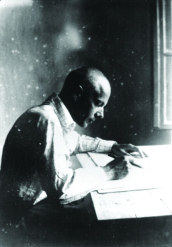
|
|
I was seventeen when I met Béla Bartók, and doing
work in the fields of the Wenckheim estate in
Kertmegpuszta, next to Vésztő. Bartók’s brother-in-law
was the estate manager there, We were working in the
fields when a man about thirty-five, with fair hair—not
tall—came over to us and asked if anyone knew any old
songs and would be prepared to sing them to him. There
were many girls all together but they were all diffident
and, in their shyness, said that they did not know any
old songs. But I volunteered.
In the
evening he came to our quarters and sat down on a
worker’s case, with a night-light beside him. I sat
opposite him and sang. He noted it down. I sang two
songs, the “Fehér László” and the “Angoli Borbála”. I
was undoubtedly awe-struck, for no more songs came to my
mind at that time. He was such a modest man, and did not
press me to sing any further.
There were
many workers in the barn—the quarters—and in the evening
everyone retired to rest. Only I sang. I well remember
how careful he was that my singing and his work did not
disturb the others. About myself I remember that I was
then already a great lover of songs, and if I heard a
new song I would set about learning it.
Mostly I
learnt these songs while working. My father died when I
was 10. I never heard my mother sing. I learnt very many
songs, but now I’m getting old and I’ve forgotten so
many of them. However, I haven’t forgotten Béla
Bartók—it’s as if he were here before me today. He has
always remained in my memory.
Recollection of Róza Ökrös, whose songs
Bartók noted down in 1918, in Malcolm Gillies, Bartók
Remembered (London, 1990), 53–54
|
|
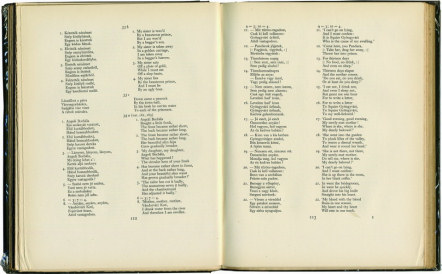
So far—pour dégourdir mes membres musicaux—I have harmonized 7 Hung. songs from my collecting in
the summer, among others Róza Ökrös’s famous Angoli
Borbála. I recommend that you listen to her because it
is truly sensational to hear such a thing in Hungarian,
and furthermore, right in the centre of the Plain, and
what’s more in 7/8 time.
But I’m already thinking about the mandarin, as well; if
it works out it will be a devilish piece. Its beginning—a very short introduction before the curtain opens—a
terrible din, clattering, rattling, hooting: I lead the
Hon. listener into the apache den from the bustle of a
metropolitan street.
Bartók to his wife Márta Ziegler,
September 5, 1918, in Bartók Béla Családi levelei
(Family letters),
ed. Béla Bartók, Jr. and Adrienne Gombocz (Budapest,
1981), 282

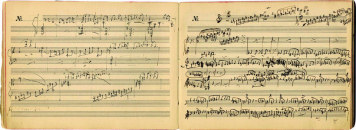 |
|
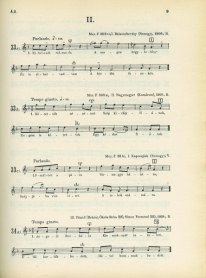
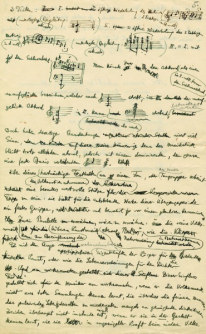 |
|
 |
So, in the meantime, I am writing music for a play by
Menyhért Lengyel, its title is: The Miraculous
Mandarin. And just listen to how miraculously
beautiful its story is. In a ruffians’ den three rogues
force a beautiful young girl to entice men up to her
place, so that they then rob them.— The first one is a
poor lad, the second one is no better, but the third one
is a rich Chinaman. It is a good catch, the girl
entertains him with dancing and the mandarin’s desire is
awakened, passionate love blazes within him, but the
girl is repulsed by him.— The ruffians attack him, rob
him, suffocate him with an eiderdown, run him through
with a sword, but all in vain, they are no match for the
mandarin, who looks at the girl with loving and longing
eyes.— Female intuition helps, the girl fulfils the
mandarin’s desire at which point he falls lifeless to
the floor.
An interview with Bartók, 1919, in
Bartók Béla válogatott írásai
(The selected writings of
Béla Bartók), ed. András Szőllősy (Budapest, 1956), 338–39
|
| |
...in Cologne after Mandarin
there was a noisy demonstration against the text
and a counter-demonstration in my support. The
riot lasted a good ten minutes and they lowered
the safety curtain, too, but the people still
didn’t leave, so the fire-door was twice opened,
too. Well, I can tell you that there was frantic
applause (and frantic hissing)! You really
should have been there, at such a big
disturbance! ... The Pest newspapers report that
the piece was officially banned; this is very
likely, and my people in Cologne were on the one
hand also afraid of this, and on the other,
Szenkár says there’s no finer publicity than a
ban like this. Well, we shall see.
Bartók to his mother, December
2, 1926, in Bartók Letters. The Musical Mind,
ed. Malcolm Gillies and Adrienne Gombocz,
unpublished
|
|
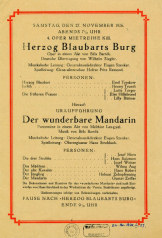 |
| |
I have received the revised text of the
Miraculous Mandarin today. The changes
(particularly from the appearance of the third
man) is unfortunately at odds with the music.
For this music—in contrast to today’s objective,
mechanic, etc. tendency—will express psychic
processes. Consequently, it is impossible to
attach a text to it, which expresses a mood
contrary to the music.
Bartók to his publisher,
Universal Edition, April 11, 1927
|
|
 |
|
|
|
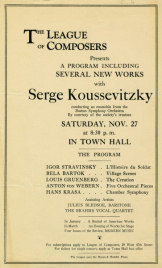
|
|
|
| |

|
|